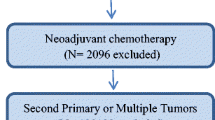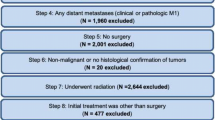Abstract
Purpose
This study aimed to improve the American Joint Committee on Cancer (AJCC) Tumor Node Metastases (TNM) staging system and demonstrate the improvement in prognostic accuracy and clinical management guidance in colon cancer using the novel prognostic score (P score).
Methods
Eligible patients were identified using the Surveillance, Epidemiology, and End Results database. A P score (based on age, tumor size, and tumor grade) was assigned to each patient. The Cox proportional hazards regression analyses were performed to identify independent factors associated with prognosis. The Kaplan–Meier survival curves were used to analyze the prognosis of patients with colon cancer with different P scores. The TNM staging system was compared with the P score in stages I–IV by calculating the concordance index.
Results
The multivariate Cox analysis indicated that a higher P score was independently associated with a higher risk of cancer-specific mortality. The Kaplan–Meier survival curves showed that the survival benefit gradually increased as the P score decreased. The concordance index rose from 0.5, 0.593, 0.633, and 0.551 of AJCC TNM staging system to 0.709, 0.651, 0.691, and 0.623 of P score in stages I–IV, respectively.
Conclusions
The P score was an independent prognostic factor of colon cancer and had a much better prognostic accuracy than the AJCC TNM staging system in all patients with colon cancer. It may help in identifying patients with high-risk stage II colon cancer who were candidates for adjuvant therapy and differentiating patients with stage III colon cancer for adjuvant therapy.



Similar content being viewed by others
References
Siegel RL et al (1900) Colorectal cancer statistics, 2017. CA Cancer J Clin 64(2):104–117
Weiser MR et al (2011) Predicting survival after curative colectomy for cancer: individualizing colon cancer staging. J Clin Oncol Off J Am Soc Clin Oncol 29(36):4796–4802
Arena EA, Bilchik AJ (2013) What is the optimal means of staging colon cancer? Adv Surg 47(1):199–211
Auclin E et al (2017) Subgroups and prognostication in stage III colon cancer: future perspectives for adjuvant therapy. Ann Oncol Off J Euro Soc Med Oncol 28(5):mdx030
Kune GA et al (1990) Survival in patients with large-bowel cancer. A population-based investigation from the Melbourne Colorectal Cancer Study. Dis Colon Rectum 33(11):938
Aquina CT, Mohile SG, Tejani MA, Becerra AZ, Xu Z, Hensley BJ, Arsalani-Zadeh R, Boscoe FP, Schymura MJ, Noyes K, Monson JRT, Fleming FJ (2017) The impact of age on complications, survival, and cause of death following colon cancer surgery. Br J Cancer 116:389–397
Mulcahy HE et al (1994) Prognosis of elderly patients with large bowel cancer. Br J Surg 81(5):736
Patel SS et al (2013) Elderly patients with colon cancer have unique tumor characteristics and poor survival. Cancer 119(4):739
Yamano T et al (2017) Influence of age and comorbidity on prognosis and application of adjuvant chemotherapy in elderly Japanese patients with colorectal cancer: a retrospective multicentre study. Eur J Cancer 81:90
Li Q et al (2014) Better long-term survival in young patients with non-metastatic colorectal cancer after surgery, an analysis of 69,835 patients in SEER database. Plos One 9(4):e93756
Cerottini JP et al (1999) Prognostic factors in colorectal cancer. Oncol Rep 6(2):409–414
Phillips MRKS et al (1984) Large bowel cancer: surgical pathology and its relationship to survival. Br J Surg 71(8):604
Gill S et al (2004) Pooled analysis of fluorouracil-based adjuvant therapy for stage II and III colon cancer: who benefits and by how much? J Clin Oncol Off J Am Soc Clin Oncol 22(10):1797
Kornprat P et al (2011) Value of tumor size as a prognostic variable in colorectal cancer: a critical reappraisal. Am J Clin Oncol 34(1):43
Saha S et al. (2012) Tumor size as a prognostic factor for patients with colon cancer undergoing sentinel lymph node mapping and conventional surgery. Ann Surg Oncol. 20(4): p. -
Saha S et al (2015) Tumor size predicts long-term survival in colon cancer: an analysis of the National Cancer Data Base. Am J Surg 209(3):570
Harrell FE et al (1982) Evaluating the yield of medical tests. JAMA 247(18):2543–2546
Manilich EA et al (2011) A novel data-driven prognostic model for staging of colorectal cancer. J Am Coll Surg 213(5):579–588.e2
Renfro LA, Grothey A, Xue Y, Saltz LB, André T, Twelves C, Labianca R, Allegra CJ, Alberts SR, Loprinzi CL, Yothers G, Sargent DJ, Adjuvant Colon Cancer Endpoints (ACCENT) Group (2014) ACCENT-based web calculators to predict recurrence and overall survival in stage III colon cancer. J Natl Cancer Inst 106(12):dju333
Benson AB et al (2004) American Society of Clinical Oncology recommendations on adjuvant chemotherapy for stage II colon cancer. J Clin Oncol Off J Am Soc Clin Oncol 22(16):3408
Casadaban L et al (2016) Adjuvant chemotherapy is associated with improved survival in patients with stage II colon cancer. Cancer 122(21):3277–3287
O'Connor ES et al (2011) Adjuvant chemotherapy for stage II colon cancer with poor prognostic features. J Clin Oncol Off J Am Soc Clin Oncol 29(25):3381–3388
Verhoeff SR et al (2016) Adjuvant chemotherapy is not associated with improved survival for all high-risk factors in stage II colon cancer. Int J Cancer 139(1):187–193
Benson AB et al (2011) NCCN clinical practice guidelines in oncology: colon cancer version 1:2012. J Natl Compr Cancer Netw 9(11):1238–1290
Labianca R et al (2013) Early colon cancer: ESMO Clinical Practice Guidelines for diagnosis, treatment and follow-up. Ann Oncol Off J Euro Soc Med Oncol 24(Suppl 6(3)):vi64
Chau I et al (2005) A randomised comparison between 6 months of bolus fluorouracil/leucovorin and 12 weeks of protracted venous infusion fluorouracil as adjuvant treatment in colorectal cancer. Ann Oncol Off J Euro Soc Med Oncol 16(4):549
Lonardi S et al (2016) Phase III trial comparing 3 to 6 months of adjuvant FOLFOX4/XELOX in stage II-III colon cancer: safety and compliance in the TOSCA trial. Ann Oncol Off J Euro Soc Med Oncol 27(11):mdw404
Cramptom P, Williams R (2009) Adjuvant chemotherapy for stage II colon cancer: the role of molecular markers in choosing therapy. Gastrointest Cancer Res 3(5):191–196
Clarklangone KM et al (2010) Translating tumor biology into personalized treatment planning: analytical performance characteristics of the Oncotype DX® Colon Cancer Assay. BMC Cancer 10(1):691
Roth AD et al (2012) Integrated analysis of molecular and clinical prognostic factors in stage II/III colon cancer. J Natl Cancer Inst 104(21):1635
Kwon KA et al (2010) Clinical significance of preoperative serum vascular endothelial growth factor, interleukin-6, and C-reactive protein level in colorectal cancer. BMC Cancer 10(1):203–203
Romanus D et al (2009) Concordance with NCCN colorectal cancer guidelines and ASCO/NCCN quality measures: an NCCN institutional analysis. J Natl Compr Cancer Netw 7(8):895–904
Acknowledgments
The authors acknowledge the effort that went into compiling and maintaining the Surveillance, Epidemiology, and End Results Program (SEER) tumor registries, including the interpretation and reporting of these data.
Funding
This work was supported by the National Natural Science Foundation of China (Grant Nos. 81702353 and 81772599) and Shanghai Municipal Natural Science Foundation (17ZR1406400). The funders had no role in the study design, data collection and analysis, decision to publish, or preparation of the manuscript.
Author information
Authors and Affiliations
Corresponding authors
Ethics declarations
Competing interests
The authors declare that they have no conflicts of interest.
Electronic supplementary material
ESM 1
(DOCX 17 kb)
Rights and permissions
About this article
Cite this article
Liu, Q., Ma, Y., Luo, D. et al. Real-world study of a novel prognostic scoring system: for a more precise prognostication and better clinical treatment guidance in stages II and III colon cancer. Int J Colorectal Dis 33, 1107–1114 (2018). https://doi.org/10.1007/s00384-018-3071-1
Accepted:
Published:
Issue Date:
DOI: https://doi.org/10.1007/s00384-018-3071-1




